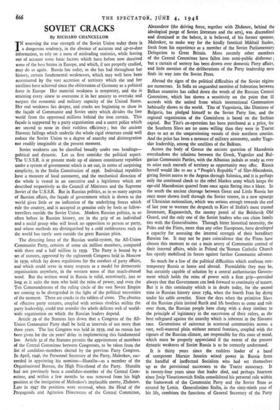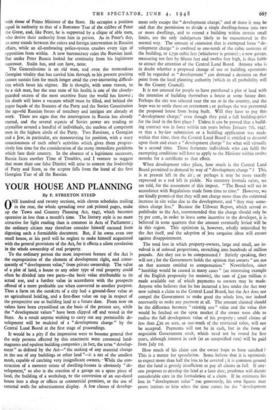SOVIET CRACKS
By RICHARD CHANCELLOR IN assessing the true strength of the Soviet Union today there is I a dangerous tendency, in the absence of accurate and up-to-date
information, to rely on a mass of misleading statistics, while leaving out of account some basic factors which have .before now deceived some of the best brains in Europe, and which, if not properly studied,
may do so again. Russia has today, as she has had throughout her history, certain fundamental weaknesses, Which may well have been accentuated by the vast accretion of territory which she and her satellites have achieved since the obliteration of Germany as a political force in Europe Her material weakness is temporary, and she is straining every sinew to overcome it in her anxiety to overtake and surpass the economic and military capacity of the United States. Her real weakness lies deeper, and cracks are beginning to show in the façade of C,onununist and Soviet unity which divides the free world from the oppressed millions behind the iron curtain. This facade is supported by a party organisation and a secret police which are second to none in their ruthless efficiency ; but the ancient Slavonic failings which underlie the whole rigid structure could well reduce the Soviet Union to a degree of anarchy and disintegration cot readily imaginable at the present moment.
Soviet weakness can be classified broadly under two headings— political and dynastic. Let us first consider the political aspect. The U.S.S.R. is at present made up of sixteen constituent republics under a system of government which is set out, in terms of surprising simplicity, in the Stalin Constitution of 1936. Individual republics have a measure of local autonomy, and the mechanical direction of the whole is vested in an executive and a legislature which are described respectively as the Council of Ministers and the Supreme ,Soviet of the U.S.S.R. But in Russian politics, as in so many aspects of Russian affairs, the facade of government which is shown to the world gives little or no indication of the underlying forces which rule the country, and is accepted as genuine only by fools or fellow- travellers outside the Soviet Union. Modern Russian politics, as so often before in Russian history, are in the grip of an individual and a social group who will brook no opposition to person or party, and whose methods are distinguished by a cold ruthlessness such as the world has rarely seen outside the great Russian plain.
The directing force of the Russian world-system, the All-Union Communist Party, consists of some six million members, compared with three and a half million in 1939. The Party is bound by a set of statutes, approved by the eighteenth Congress held in Moscow in 1939, which lay down regulations for the conduct of party affairs, and which could serve in many respects as a model for democratic organisations anywhere, in the western sense of that much-abused word. But the written word in Russia is valid, notoriously, just so long as it suits the men who hold the reins of power, and even the Ten Commandments of the ruling circle of the vast Soviet Empire are coming to be disregarded in the light of the political necessities of the moment. There are cracks in the tablets of stone. The absence of effective party statutes, coupled with serious rivalries within the party leadership, could tear asunder the whole delicate web of world- wide organisation on which the Russian leaders depend.
Article 29 of the Statutes lays down that a Congress of the All- Union Communist Party shall be held at intervals of not more than three years. The last Congress was held in 5939, and no reason has been given for the six years' delay in implementing this fundamental law. Article 32 of the Statutes permits the appointment of members of the Central Committee between Congresses, to be taken from the list of candidate-members eleaed by the previous Party Congress. In April, 1946, the Personnel Secretary of the Party, Malenkov, suc- ceeded in appointing his nominee—Shatalin—as a member of the Organisational Bureau, the High Priesthood of the Party. Shatalin had not previously been a candidate-member of the Central Com- mittee, and within a few months he was removed from his high position at the instigation of Malenkov's implacable enemy, Zhdanov. Late in 1947 the positions were reversed, when the Head of the Propaganda and Agitation Directorate of the Central Committee, Alexandrov (the driving force, together with Zlidanov, behind the ideological purge of Soviet literature and the arts), was discredited and dismissed at the behest, it is believed, of his former sponsor, Malenkov, to make way for the kindly fanatical Mikhail Suslov, fresh from his experience as a member of the Soviet Parliamentary Delegation to Great Britain. More recently other members of the Central Committee have fallen into semi-public disfavour ; but a curtain of secrecy has been drawn over domestic Party affairs, and little mention of the deliberations of the Party leadership now finds its way into the Soviet Press.
Abroad the signs of the political difficulties of the Soviet regime are numerous. In Sofia an unguarded mention of federation between
Balkan countries has called down the wrath of the Russian Central Committee, which has shown a sensitivity on the point that ill accords with the united front which international Communism habitually shows to the world. Tito of Yugoslavia, like Dimitrov of Bulgaria, has pledged himself to the Soviet Party line, and the regional organisation of the Cominform is based on the Serbian capital. But Tito's co-operation has been purchased at a price, for the Southern Slays are no more willing than they were in Tsarist days to act as the unquestioning vassals of their northern cousins. And the price has been a measure of military autonomy, under Yugo- slav leadership, among the satellites of the Balkans.
Across the body of Greece the ancient question of Macedonia overshadows the relations between the Greek, Yugoslav and Bul- garian Communist Parties, with the Albanian jackals as ready as ever to seize such morsels of territory as opportunity may offer. Russia herself would like to see a "People's Republic" of Slav-Macedonia, giving Soviet access to the Aegean through Salonica, and it is perhaps only the continued check to the rebel Markos army which keeps the age-old Macedonian quarrel from-once again flaring into a blaze. In the south the ancient cleavage between Great and Little Russia has once more shown itself through the Soviet veneer, in a new upsurge of Ukrainian nationalism, which was serious enough towards the end of last year to warrant the despatch to Kiev of Stalin's most trusted lieutenant, Kaganovitch, the stormy petrel of the Bolshevik Old Guard, and the only one of the Soviet leaders who can claim family ties with the Generalissimo. Through bitter historical necessity, the Poles and the Finns, more than any other Europeans, have developed a capacity for assessing the internal strength of their hereditary Russian foe. It may not be pure coincidence that the Finns have chosen this moment to out a main artery of Communist control of their internal affairs, while in Poland the 'Roman Catholic Church has openly mobilised its forces against further Communist advance.
So much for a few of the political difficulties which confront con- temporary Russia at home and abroad. Formidable they may be, but certainly capable of solution by a central authoritarian Govern- ment which holds the reins of power with a firm grip—provided always that that Government can look forward to continuity of tenure. But it is this continuity which is in doubt today, for the second time in Russian history since 1584, when the fourth Ivan lay dying under his sable coverlet. Since the days when the primitive Slays of the Russian plain invited Rurik and his brothers to come and rule over them, the Russian people have clung with a deep instinct to the principle of legitimacy in the succession of their rulers, as the best safeguard against the anarchy which is inherent in the Slavonic race. Generations• of existence in scattered communities across a vast, well-watered plain without natural frontiers, coupled with the rigours of the Russian climate, are responsible for this state of mind, which must be properly appreciated if the extent of the present dynastic weakness of Soviet Russia is to be correctly understood.
It is thirty years since the ruthless leader of a band of competent Marxist fanatics seized power in Russia from the handful of ineffectual Socialists who had set themselves up as the provisional successors to the Tsarist autocracy. It is twenty-four years since that leader died, and perhaps fourteen since Josip Vissarionovich Stalin consolidated his personal rule within the framework of the Communist Party and the Soviet State as created by Lenin. Generalissimo Stalin, in the sixty-ninth year of his life, combines the functions of General Secretary of the Party with those of Prime Minister of the State. He occupies a position equal in authority to that of a Romanov Tsar of the calibre of Peter the Great, and, like Peter, he is supported by a clique of able men, who derive their authority from him in person. As in Peter's day, an army stands between the rulers and foreign intervention in Russian affairs, while an all-embracing police-system crushes every sign of opposition from within. A new bureaucracy rules the Russian land. But under Peter Russia looked for continuity from his legitimate successor. Stalin has, and can have, none.
The Generalissimo is an old man, and even the tremendous Georgian vitality that has carried him through to his present position cannot sustain him for much longer amid the ever-increasing difficul- ties which beset his regime. He is thought, with some reason, to
I be a sick man, but the true state of his health is one of the closely- guarded secrets of the most secretive State the world has known ; his death will leave a vacuum which must be filled, and behind the paper facade of the Statutes of the Party and the Soviet Constitution the age-old Russian forces of treachery and intrigue are already at work. There are signs that the interregnum in Russia has already started, and the several aspects of Soviet power are tending to crystallise around a handful of individuals, the nucleus of competent men in the highest circle of the Party. Two Russians, a Georgian and a Jew, in particular, are manoeuvring for position, with a wary consciousness of each other's activities which gives than progres- sively less time for the consideration of the many immediate problems which face their country. In the absence of a legitimate successor, Russia faces another Time of Troubles, and I venture to suggest that more than one false Dimitri will arise to contest the leadership of Party and State, as the sceptre falls from the hand of the first Georgian Tsar of all the Russias.



































 Previous page
Previous page